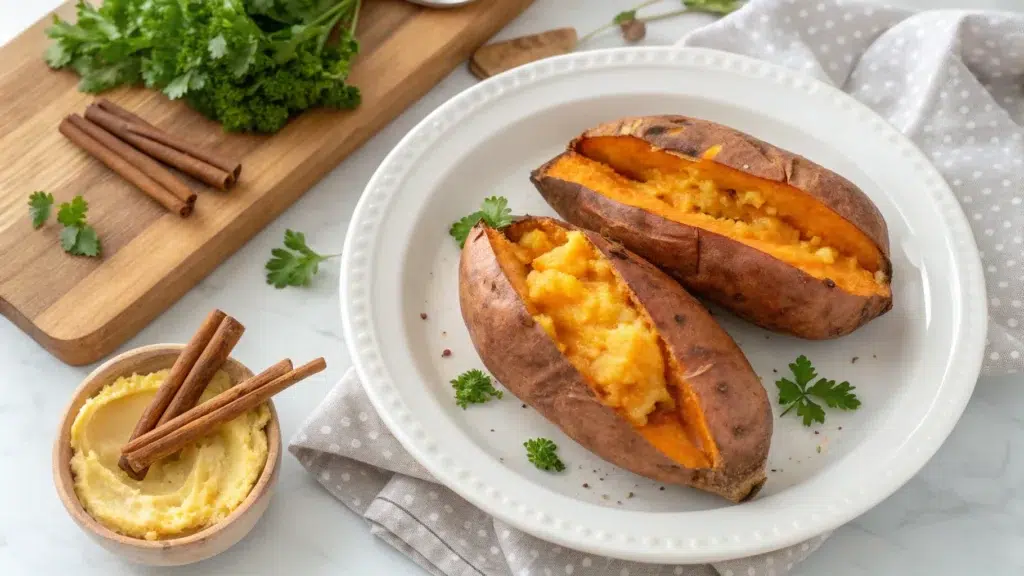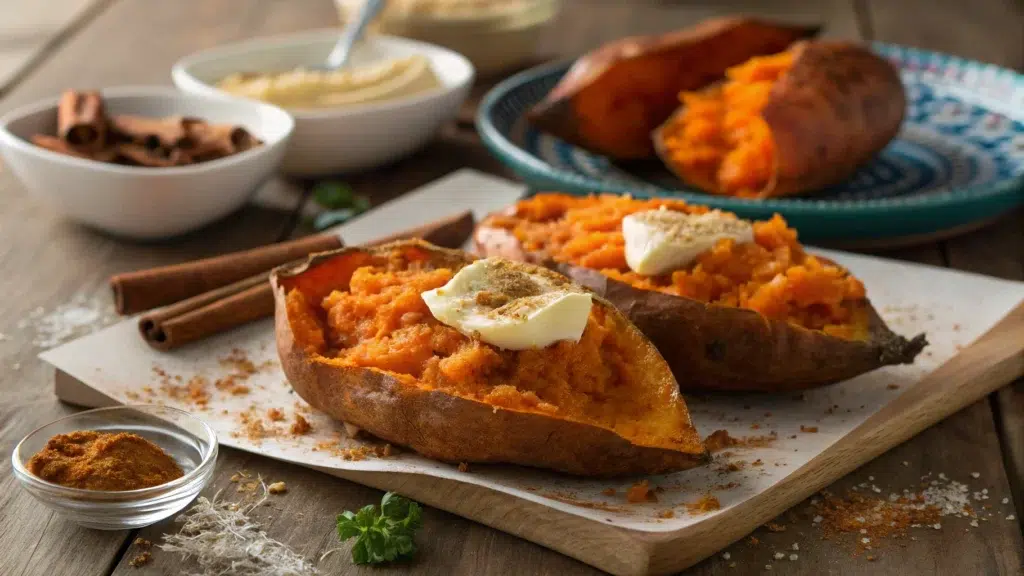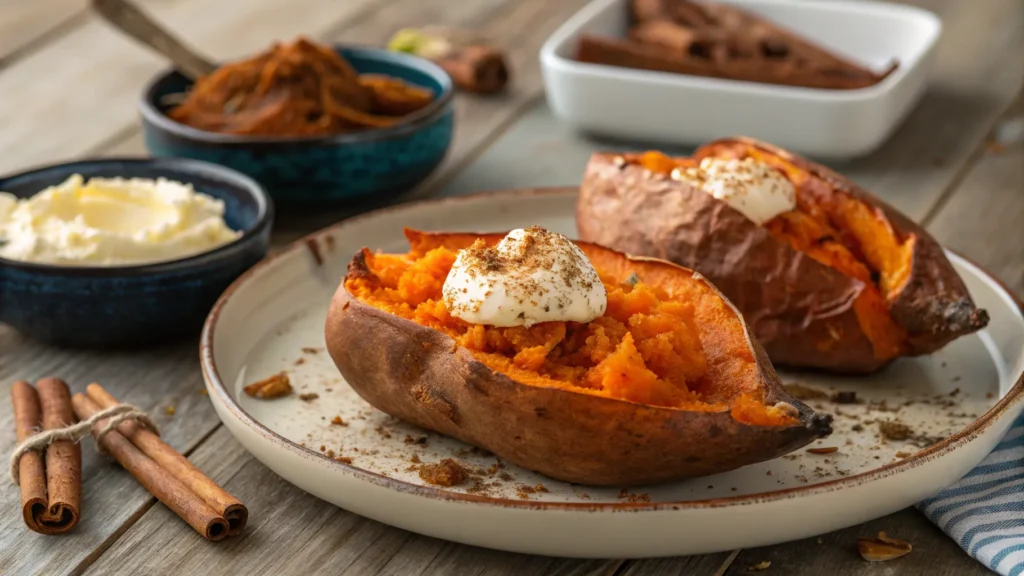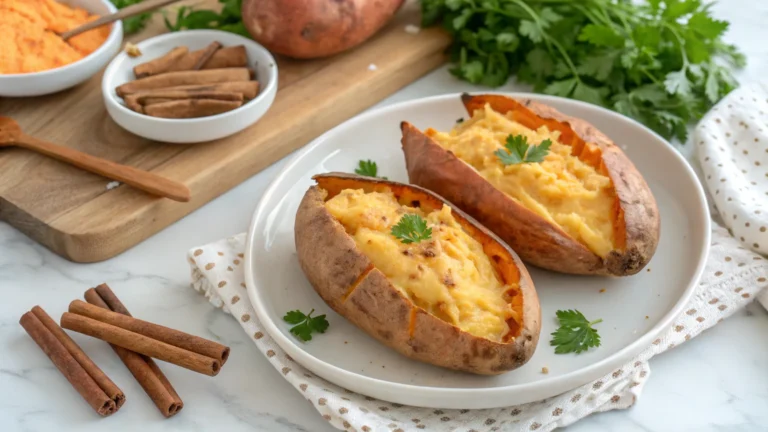Sweet potatoes are beloved for their sweetness, vibrant colour, and impressive nutritional profile. But when it comes to preparing them, many wonder: is it better to boil or bake sweet potatoes? This decision isn’t just about taste it affects nutrition, texture, and even your health. In this article, we’ll compare these two popular cooking methods, examining their impact on nutrients, flavor, and convenience. We’ll also provide insights into when to use each method depending on the dish you’re making. Let’s dive in!
Nutritional Differences Between Boiled and Baked Sweet Potatoes
Impact on Vitamin Retention
When it comes to retaining nutrients, boiling sweet potatoes holds a surprising advantage. This method is particularly good for preserving beta-carotene, a precursor to vitamin A that’s responsible for the tuber’s vivid orange hue. Studies show that boiling sweet potatoes can retain up to 92% of beta-carotene, compared to baking, which may cause significant loss of this vital nutrient.
The reason for this difference lies in the cooking process itself. Baking exposes sweet potatoes to prolonged heat, which can break down water-soluble vitamins. In contrast, boiling uses lower temperatures and shorter cooking times, helping to preserve these nutrients.
Antioxidant Levels
Antioxidants are another key consideration. Boiling tends to protect the antioxidants found in sweet potato peels better than baking. Baking can reduce antioxidant levels in the skin by more than 60%, while boiling minimizes this loss. If you’re looking to maximize your intake of these protective compounds, boiling may be the better choice.

Flavor and Texture Variations
Flavor Profile
When asking if it is better to boil or bake sweet potatoes, taste often tops the list of concerns. Baking sweet potatoes brings out their natural sweetness by caramelizing their sugars. This gives baked sweet potatoes a rich, dessert-like flavour that many people love. The higher temperatures in baking cause the sugars to brown, creating that deep, earthy sweetness.
On the other hand, boiling doesn’t allow for caramelization. Boiled sweet potatoes have a milder, more straightforward taste. They don’t have the same depth of flavour as their baked counterparts but blend well in recipes where the focus is on other ingredients, like soups or stews.
Texture Differences
Texture is another significant factor when choosing between boiling and baking. Boiled sweet potatoes develop a soft, creamy texture that’s ideal for dishes like mashed sweet potatoes or casseroles. Their softer consistency makes them easy to blend and mash, creating a smooth, velvety base for a variety of meals.
In contrast, baked sweet potatoes retain a firmer texture. Their outer skin becomes slightly crisp, while the flesh stays tender yet structured. This makes baked sweet potatoes perfect for serving whole or as a side dish, especially when topped with butter, cinnamon, or marshmallows.
Glycemic Index Considerations
Effect of Cooking Methods on Glycemic Index
When deciding whether it is better to boil or bake sweet potatoes, you might want to think about how the cooking method impacts your blood sugar. Sweet potatoes have a naturally lower glycemic index (GI) compared to regular potatoes, but the way you cook them can change this significantly.
Boiling sweet potatoes is the clear winner for keeping the glycemic index low. When cooked, the GI of sweet potatoes can be as low as 41-50, meaning they release sugar into your bloodstream more slowly. This makes them a better option for people managing diabetes or watching their blood sugar levels.
Baking sweet potatoes, however, raises their glycemic index. The extended exposure to heat breaks down starches into simpler sugars, resulting in a higher GI. While baked sweet potatoes are still a healthy choice, they might cause a quicker spike in blood sugar compared to boiled ones.
Choosing the right method ultimately depends on your dietary needs and how you plan to enjoy this versatile vegetable. If you’re after a dish that’s both sweet and healthy, boiling might just be your best bet.

Cooking Time and Convenience
Time Efficiency
When pondering whether it is better to boil or bake sweet potatoes, cooking time is a key factor. Boiling sweet potatoes typically takes about 15 to 20 minutes, depending on the size of the pieces. In contrast, baking can require 45 minutes to an hour, especially for whole potatoes. Therefore, if you’re short on time, boiling is the quicker method.
Ease of Preparation
Boiling sweet potatoes is straightforward. Simply peel (if desired), cut into uniform pieces, and place them in boiling water until tender. This method requires minimal attention, allowing you to multitask in the kitchen. Baking, however, involves preheating the oven and occasionally checking for doneness, which can be less convenient when time is limited.
For more delicious recipes, check out our Sweet Potato and Black Bean Chili.
Best Uses for Boiled Sweet Potatoes
Ideal Dishes
Boiled sweet potatoes are incredibly versatile and serve as a base for numerous dishes. Their soft, creamy texture makes them perfect for mashing, creating a smooth purée ideal for side dishes or pie fillings. Additionally, they blend seamlessly into soups and stews, adding natural sweetness and thickness.
For instance, incorporating boiled sweet potatoes into a hearty stew enhances both flavour and nutritional value. They also work well in salads, providing a tender contrast to crisp greens and other vegetables.
For more delicious recipes, check out our Sweet Potato and Black Bean Chili.
Best Uses for Baked Sweet Potatoes
Ideal Dishes for Baked Sweet Potatoes
Baked sweet potatoes are a treat all on their own, making them perfect for simple, satisfying meals. They’re incredibly delicious when served whole, topped with butter, cinnamon, or a dollop of yoghurt. The baking process enhances the natural sugars, delivering a caramelized sweetness that pairs beautifully with savoury or sweet toppings.
For those wondering if it is better to boil or bake sweet potatoes for side dishes, baking is the way to go. The firmer texture of baked sweet potatoes holds up well when cut into chunks and roasted alongside other vegetables. They also shine in recipes like sweet potato fries, where crisp edges are essential.
Creative Serving Ideas
Baked sweet potatoes can be transformed into stuffed dishes by loading them with fillings like black beans, shredded chicken, or quinoa. Additionally, the baked variety works wonders in casseroles, where their firm texture provides structure to layered dishes. For desserts, baked sweet potatoes can be mashed and blended into pie fillings or cakes, taking advantage of their rich, sugary taste.

Health Considerations
Nutritional Comparison
One key question in deciding whether it is better to boil or bake sweet potatoes is how each method affects its health benefits. While baking preserves more fibre, boiling retains more water-soluble vitamins like vitamin C and beta-carotene. If you’re focusing on nutrient preservation, boiling may be the healthier choice. However, baking is a solid option when you’re looking to enjoy the sweet potato’s natural sweetness without added sugars.
Caloric Content
Both boiling and baking leave sweet potatoes naturally low in fat and calories. However, additional ingredients often tip the balance. For example, baked sweet potatoes are often paired with toppings like butter or cheese, which can increase their calorie count. Boiled sweet potatoes, often used as a base in recipes, may help you control added fats more easily.
Final Health Tip
If you’re managing blood sugar levels, boiling is the better option due to its lower glycemic index. But if you’re aiming for a fuller flavour and fibre content, baked sweet potatoes are an excellent choice. Either way, sweet potatoes are nutrient-rich, making them a great addition to any diet.
Environmental and Energy Considerations
Energy Consumption
When debating whether it is better to boil or bake sweet potatoes, the environmental impact of each cooking method is worth considering. Boiling sweet potatoes generally consumes less energy because it requires a shorter cooking time and doesn’t involve preheating an oven. This makes boiling the more energy-efficient option, especially for small quantities.
On the other hand, baking can be less efficient, particularly if the oven is used solely for sweet potatoes. However, if you’re baking multiple items at once, this method can become more eco-friendly. Choosing the right method depends on your cooking habits and whether you’re preparing a single dish or a full meal.
Waste and Water Usage
Boiling uses water, but it often produces less waste because the peel is more straightforward to remove post-cooking. Baking, however, doesn’t require water, making it a better option for those in areas where water conservation is important. Each method has trade-offs, so it’s important to balance convenience with environmental consciousness.
Conclusion and Recommendations
Summary of Findings
So, is it better to boil or bake sweet potatoes? The answer largely depends on your goals. Boiling is faster, retains more beta-carotene, and has a lower glycemic index, making it the healthier option for nutrient preservation and blood sugar control. Baking, on the other hand, enhances flavour by caramelizing sugars, creating a sweet and slightly crispy texture that’s perfect for standalone dishes.

